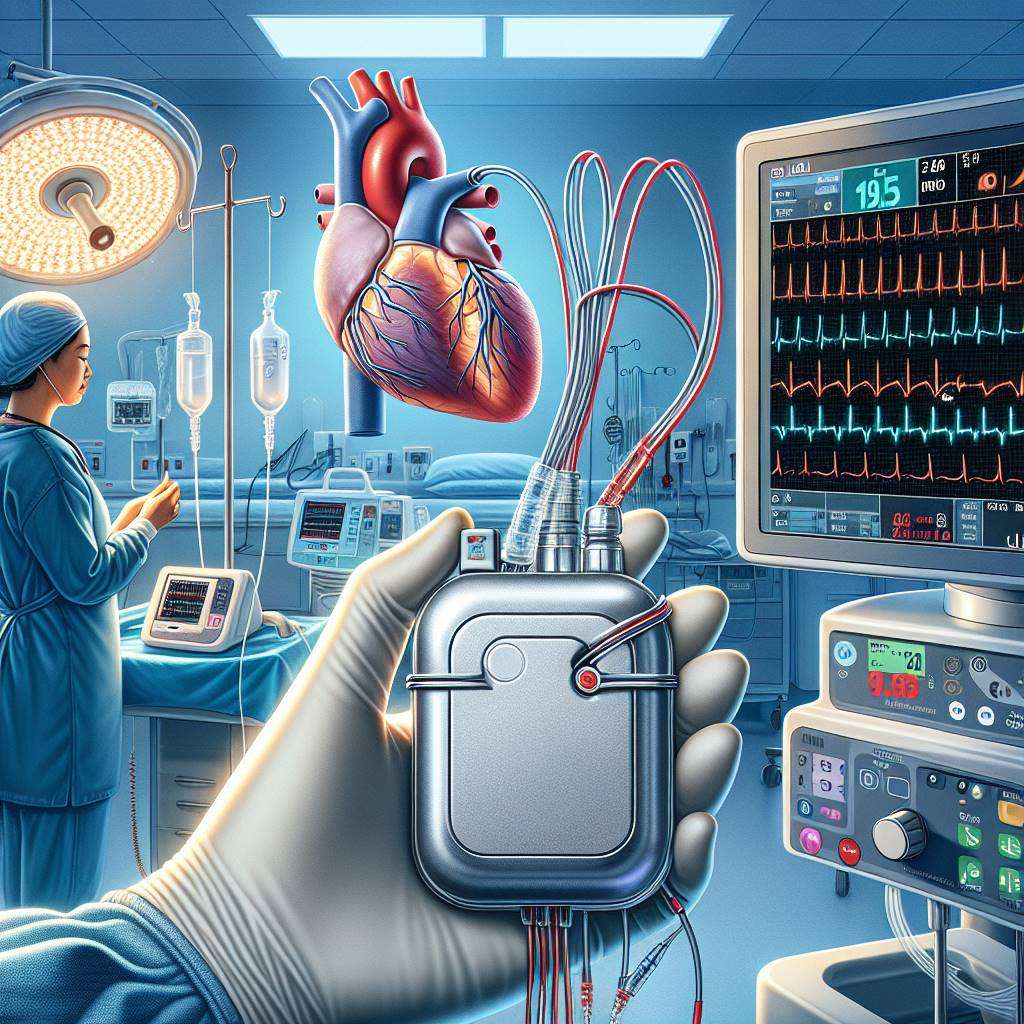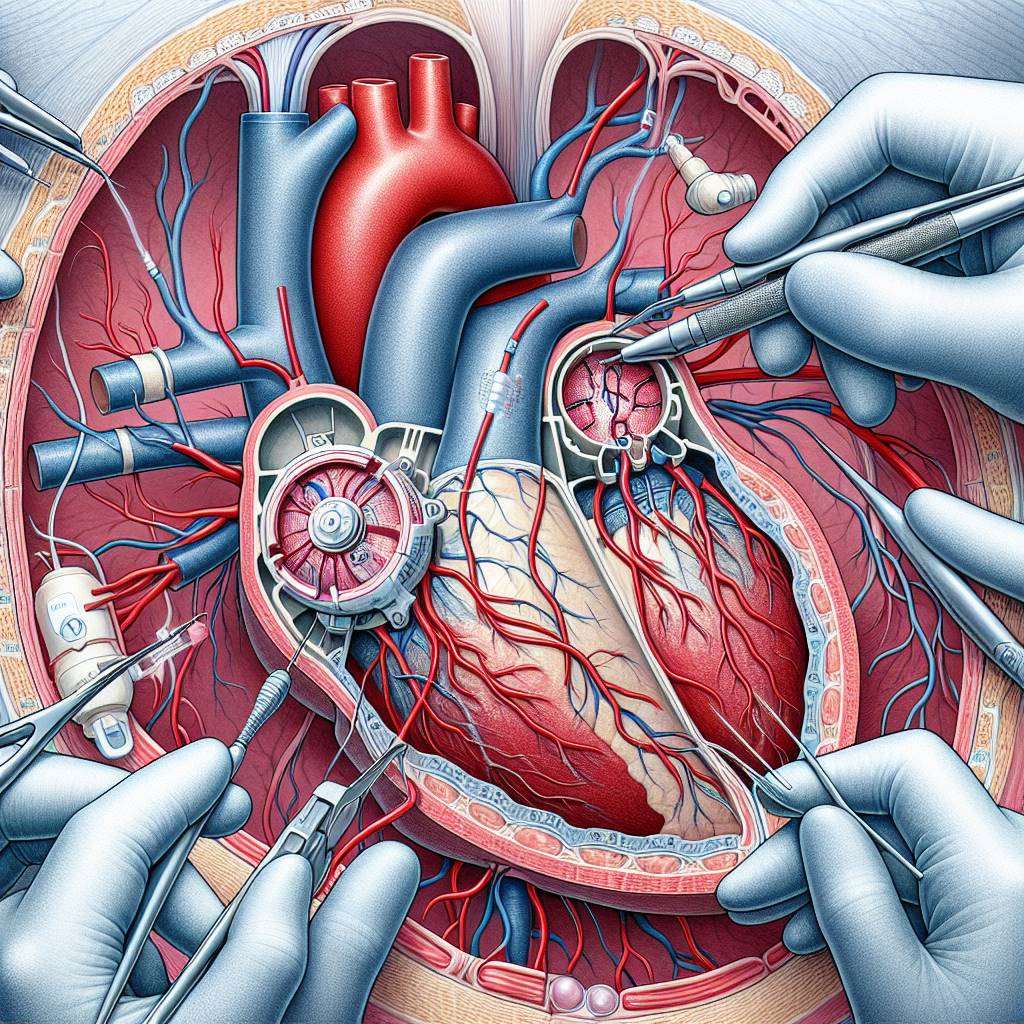An AICD (Automatic Implantable Cardioverter Defibrillator) and a pacemaker are two essential medical devices used to manage heart conditions. While both help regulate heart rhythms, their functions and purposes differ significantly. Understanding these differences is crucial for patients and caregivers to make informed decisions about treatment options.
Medical disclaimer: This content is for general awareness and does not replace a doctor’s consultation. For diagnosis or treatment decisions, consult a qualified specialist.
Both devices are life-saving technologies, but they cater to distinct cardiac conditions. A pacemaker primarily addresses slow heart rhythms, while an AICD is designed to prevent sudden cardiac arrest. Knowing which device is suitable for your condition can improve outcomes and enhance quality of life. Let’s explore their functions, benefits, and differences in detail.
What Is an AICD and How Does It Work?
An AICD, or Automatic Implantable Cardioverter Defibrillator, is a small device implanted in the chest to monitor and correct life-threatening heart rhythms. It is primarily used for patients at risk of sudden cardiac arrest due to conditions like ventricular fibrillation or ventricular tachycardia. The AICD continuously tracks the heart's electrical activity and delivers a shock if it detects an abnormal rhythm.
The device consists of a pulse generator and leads that connect to the heart. When a dangerous arrhythmia occurs, the AICD delivers a controlled electrical shock to restore a normal rhythm. This makes it a critical tool for preventing fatal cardiac events in high-risk patients. Unlike a pacemaker, an AICD is specifically designed to intervene in emergencies.

Understanding Pacemakers: Function and Purpose Explained
A pacemaker is a medical device used to regulate slow or irregular heartbeats, a condition known as bradycardia. It works by sending electrical impulses to the heart to ensure it beats at a normal rate. Pacemakers are commonly recommended for patients experiencing fatigue, dizziness, or fainting due to a slow heart rhythm.
The device is implanted under the skin, typically near the collarbone, and connected to the heart via leads. Modern pacemakers can adapt to a patient’s activity level, increasing the heart rate during exercise and slowing it during rest. Unlike an AICD, a pacemaker does not deliver shocks to correct dangerous arrhythmias but focuses on maintaining a steady heartbeat.
AICD vs. Pacemaker: Which One Do You Need?
Choosing between an AICD and a pacemaker depends on your specific heart condition. If you are at risk of sudden cardiac arrest due to severe arrhythmias, an AICD is the preferred option. However, if your primary issue is a slow or irregular heartbeat, a pacemaker may be more suitable.
Your cardiologist will evaluate your medical history, symptoms, and diagnostic tests like an ECG or Holter monitor to determine the right device. Factors such as age, lifestyle, and underlying conditions also play a role in the decision-making process. Both devices are life-saving, but their applications are tailored to different cardiac needs.
Key Differences Between AICD and Pacemaker Devices
While both AICDs and pacemakers are implanted devices that manage heart rhythms, their functions and purposes differ significantly. Here’s a quick comparison:
| Feature |
AICD |
Pacemaker |
| Primary Function |
Prevents sudden cardiac arrest |
Regulates slow heart rhythms |
| Delivers Shocks |
Yes |
No |
| Conditions Treated |
Ventricular fibrillation, ventricular tachycardia |
Bradycardia |
Understanding these differences can help patients and caregivers make informed decisions about their treatment options. Always consult your doctor for personalized advice.
How AICDs Help Prevent Sudden Cardiac Arrest
Sudden cardiac arrest (SCA) is a life-threatening condition where the heart suddenly stops beating. An AICD plays a crucial role in preventing SCA by continuously monitoring the heart's rhythm and delivering a shock when needed. This immediate intervention can save lives, especially in patients with a history of severe arrhythmias.
AICDs are particularly beneficial for individuals diagnosed with conditions like ventricular tachycardia or ventricular fibrillation. These devices not only provide life-saving therapy but also offer peace of mind to patients and their families. Regular follow-ups with your cardiologist are essential to ensure the device functions optimally and meets your medical needs.
When Is a Pacemaker Recommended for Heart Patients?
A pacemaker is a small device implanted under the skin to help regulate abnormal heart rhythms, known as arrhythmias. It is typically recommended for patients who experience bradycardia (a slow heart rate) or heart block, where the electrical signals in the heart are delayed or blocked entirely.
Doctors may suggest a pacemaker for individuals who experience symptoms such as dizziness, fainting, fatigue, or shortness of breath due to an irregular heartbeat. It is also used in cases of sick sinus syndrome, where the heart's natural pacemaker does not function properly.
Pacemakers are designed to improve quality of life by ensuring the heart maintains a steady rhythm. They are especially beneficial for elderly patients or those with chronic heart conditions that affect the heart's electrical system.

Are AICDs and Pacemakers the Same Thing?
Although both AICDs (Automatic Implantable Cardioverter Defibrillators) and pacemakers are devices implanted in the chest to manage heart conditions, they serve different purposes. A pacemaker primarily regulates slow or irregular heart rhythms, while an AICD is designed to prevent sudden cardiac death by delivering a shock to restore normal rhythm during life-threatening arrhythmias like ventricular fibrillation.
Another key difference is that AICDs have the ability to monitor and respond to dangerous heart rhythms automatically, whereas pacemakers are more focused on maintaining a consistent heart rate. Both devices are life-saving but are prescribed based on the specific needs of the patient.
Understanding these differences is crucial for patients and caregivers when discussing treatment options with their cardiologist.
Who Needs an AICD vs. a Pacemaker Implant?
The decision to implant an AICD or a pacemaker depends on the patient's specific heart condition. AICDs are typically recommended for individuals at high risk of sudden cardiac arrest due to conditions like ventricular tachycardia or heart failure. These devices are lifesaving for patients with a history of dangerous arrhythmias.
On the other hand, pacemakers are more suitable for patients with conditions such as bradycardia, heart block, or sick sinus syndrome. These conditions cause the heart to beat too slowly or irregularly, leading to symptoms like fatigue or fainting.
- AICD: For life-threatening arrhythmias and sudden cardiac arrest prevention.
- Pacemaker: For managing slow or irregular heart rhythms.
Consulting a cardiologist is essential to determine the most appropriate device based on the patient's medical history and symptoms.
Risks and Benefits of AICD vs. Pacemaker Devices
Both AICDs and pacemakers offer significant benefits but also carry certain risks. The primary benefit of an AICD is its ability to prevent sudden cardiac death by delivering a shock during life-threatening arrhythmias. Pacemakers, on the other hand, improve quality of life by maintaining a steady heart rate and reducing symptoms like fatigue and dizziness.
However, there are risks associated with both devices. These include infection at the implantation site, device malfunction, or complications during the surgical procedure. AICDs may also deliver unnecessary shocks in rare cases, which can be distressing for patients.
Despite these risks, the benefits of these devices often outweigh the potential complications, especially for patients with severe heart conditions.
Battery Life: AICD vs. Pacemaker Longevity Compared
The battery life of an implanted device is an important consideration for patients. Generally, pacemakers have a longer battery life compared to AICDs. Pacemakers typically last between 5 to 15 years, depending on usage and the type of device. AICDs, which perform more complex functions like delivering shocks, usually have a battery life of 5 to 7 years.
Both devices require regular follow-ups to monitor battery status. When the battery is low, a replacement procedure is necessary, which is less invasive than the initial implantation.
| Device |
Average Battery Life |
| Pacemaker |
5–15 years |
| AICD |
5–7 years |
Discussing battery longevity with your doctor can help you plan for future replacements and ensure uninterrupted device performance.
Implantation Process: AICD vs. Pacemaker Surgery Details
The implantation process for an AICD (Automatic Implantable Cardioverter Defibrillator) and a pacemaker differs based on their function. An AICD is designed to monitor and correct life-threatening arrhythmias, while a pacemaker regulates slower heart rhythms.
During an AICD implantation, the device is placed under the skin, typically near the collarbone, with leads connected to the heart. This procedure is slightly more complex as the device must detect and deliver shocks for abnormal rhythms. In contrast, a pacemaker implantation involves placing a smaller device to send electrical impulses to maintain a steady heart rate.
Both procedures are minimally invasive and performed under local anesthesia, but recovery times and risks may vary. Discussing the specifics with your cardiologist is essential for understanding the best option for your condition.

Cost Comparison: AICD vs. Pacemaker in India
The cost of an AICD is generally higher than that of a pacemaker due to its advanced functionality. In India, the price of an AICD can range from ₹5,00,000 to ₹10,00,000, depending on the brand and hospital. Pacemakers, on the other hand, typically cost between ₹50,000 and ₹3,00,000.
Factors influencing the cost include the type of device (single-chamber, dual-chamber, or biventricular), hospital facilities, and the expertise of the surgeon. Additionally, post-implantation care and follow-up visits may add to the overall expense.
Patients should also consider insurance coverage and government health schemes, which can significantly reduce out-of-pocket expenses. Always consult your healthcare provider to understand the total cost and available financial assistance options.
Living with an AICD vs. Living with a Pacemaker
Living with an AICD or a pacemaker requires certain lifestyle adjustments. An AICD is designed to deliver shocks during life-threatening arrhythmias, which can be startling but lifesaving. Patients may need to avoid activities that could interfere with the device, such as contact sports.
Pacemaker users, on the other hand, often experience fewer restrictions as the device primarily regulates slow heart rhythms. However, both AICD and pacemaker patients should avoid strong electromagnetic fields, such as those from MRI machines or industrial equipment.
Regular follow-ups are crucial to ensure the device is functioning correctly. With proper care, most patients can lead a normal, active life. Emotional support and counseling may also help in adapting to life with these devices.
Monitoring and Follow-Up Care for AICD and Pacemaker
Post-implantation care is vital for both AICD and pacemaker patients. Regular follow-ups ensure the device is functioning optimally and the leads are correctly positioned. These visits often include device interrogation, where the cardiologist checks the device's settings and battery life.
For AICD patients, monitoring is crucial as the device may deliver shocks during arrhythmias. Any unusual symptoms, such as dizziness or multiple shocks, should be reported immediately. Pacemaker patients also require periodic checks to ensure the device is maintaining a steady heart rhythm.
Both devices have a battery life of 5–10 years, after which replacement is necessary. Patients should maintain a record of their follow-up schedule and adhere to their doctor’s recommendations for optimal heart health.
Choosing Between AICD and Pacemaker: What to Consider
Deciding between an AICD and a pacemaker depends on your specific heart condition. An AICD is recommended for patients at risk of sudden cardiac arrest due to ventricular arrhythmias, while a pacemaker is ideal for those with bradycardia or heart block.
Factors to consider include the severity of your condition, lifestyle, and cost. AICDs are more advanced and expensive but provide life-saving interventions. Pacemakers are simpler devices that effectively manage slow heart rates.
Consulting a cardiologist is crucial to evaluate your medical history, symptoms, and diagnostic tests. Understanding the benefits and limitations of each device will help you make an informed decision tailored to your health needs.
Best Aicd Implantation Doctors in India
Dr. Balbir Singh, a renowned cardiologist at Max Super Speciality Hospital, Delhi, specializes in electrophysiology and cardiac devices with over 30 years of experience. Another expert is Dr. Praveen Chandra from Medanta - The Medicity, Gurugram, a leading interventional cardiologist with DM in Cardiology and extensive international exposure. Both are recognized for their expertise in AICD implantation and patient care excellence.
Learn more on best aicd implantation doctors in india
Best Aicd Implantation Hospitals in India
Fortis Escorts Heart Institute, Delhi, a NABH-accredited hospital, is known for its advanced electrophysiology labs and multidisciplinary cardiac care. Apollo Hospitals, Chennai, a JCI-accredited facility, offers cutting-edge AICD implantation with robotic assistance and international patient services. Both hospitals have a track record of successful outcomes and global recognition.
Find more best aicd implantation hospitals in india
Aicd Implantation Cost in India
The cost of AICD implantation in India typically ranges from INR 4,00,000 to INR 8,00,000 (approximately USD 5,000 to USD 10,000). Factors influencing costs include the type of device, hospital category, and doctor’s expertise. The average hospital stay is 2-3 days. India offers a significant cost advantage compared to Western countries, with options for insurance coverage and third-party financing.
Learn aicd implantation cost in india
Aicd Implantation Treatment in India
AICD implantation in India involves placing the device under the skin, connecting leads to the heart, and programming it to monitor and correct abnormal rhythms. Advanced technologies like 3D mapping and robotic assistance are used in top hospitals. Recovery typically takes 1-2 weeks. Indian hospitals follow global medical protocols and adopt innovations to ensure patient safety and successful outcomes.
Learn on Aicd Implantation Treatment in India
FAQs
What is the main difference between an AICD and a pacemaker?
An AICD is designed to monitor and correct life-threatening arrhythmias by delivering shocks, while a pacemaker primarily regulates slow heart rhythms by sending electrical impulses.
Can an AICD also function as a pacemaker?
Yes, most modern AICDs have built-in pacemaker functionality to manage both slow and fast heart rhythms effectively.
How long does an AICD or pacemaker last?
The battery life of an AICD or pacemaker typically ranges from 5 to 10 years, depending on usage and device type.
Is the implantation procedure for AICD and pacemaker different?
The procedures are similar, involving the placement of leads and the device under the skin. However, AICD implantation may require additional programming for shock delivery.
Are there risks associated with AICD or pacemaker implantation?
Both procedures carry minimal risks, such as infection, bleeding, or lead displacement. These are rare and managed effectively by experienced cardiologists.
Can I travel with an AICD or pacemaker?
Yes, patients with an AICD or pacemaker can travel. However, they should carry their device identification card and avoid strong electromagnetic fields.
What activities should I avoid after getting an AICD or pacemaker?
Patients should avoid heavy lifting, strenuous activities, and contact sports for a few weeks post-implantation. Long-term restrictions are minimal.
How often do I need follow-ups after implantation?
Regular follow-ups every 3-6 months are recommended to monitor the device function and battery life.
Can an AICD or pacemaker be replaced?
Yes, replacement is a straightforward procedure performed when the battery depletes or if the device malfunctions.
Are AICD and pacemaker procedures covered by insurance in India?
Most health insurance plans in India cover AICD and pacemaker implantation. Patients should confirm with their provider for specific coverage details.
The Future of AICD Technology and Patient Experiences
As advancements in medical technology continue to unfold, the integration of artificial intelligence into Automatic Implantable Cardioverter Defibrillators (AICDs) is transforming patient care. The evolution of AICD technology, particularly through the use of AI and smart algorithms, is enhancing device functionality and patient outcomes. For a deeper understanding of these innovations, check out our blog on how AICD technology is evolving with AI and smart algorithms.
While the technological advancements are promising, it's also essential to understand the patient experience associated with AICDs. Many individuals wonder what it feels like to receive a shock from an AICD. Insights into these experiences can provide valuable context for patients and their families. To learn more about this aspect, read our article on how shocks from an AICD feel: patient experiences explained.
By bridging the gap between technology and personal experiences, we can foster a better understanding of AICDs and their impact on patients' lives.